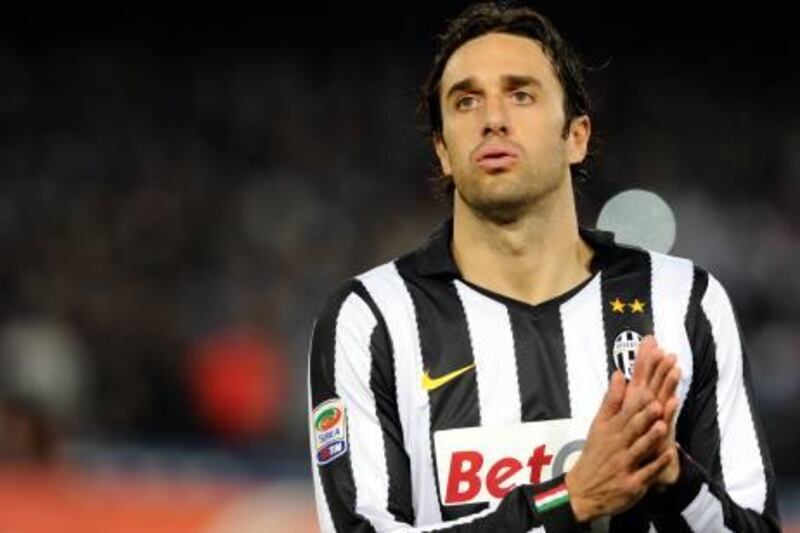Physiotherapists and sports scientists often give credence to a theory that appeals to late-developing, veteran sportsmen.
It says that the later an athlete reaches the elite, the longer into his 30s he might reasonably expect to stay there.
Typically, the human body has a limited time it can handle batterings inflicted by, say, the two match a week rigours of top-flight professional football.
But look after yourself, and ease in slowly to the upper echelons of the game, and you might keep at bay the symptoms of burnout longer than a player who was promoted as a prodigy in his teens.
Luca Toni, who has joined Al Nasr from Juventus, is 34. That puts him in the same age range as one or two who preceded him recently to the UAE, having spent the majority of their careers in Italian club football.
Like Fabio Cannavaro, who maintains an association with Al Ahli, Toni played a senior part in winning the 2006 World Cup. Like David Trezeguet, the France striker who had a dismal spell at Baniyas, he was a prolific scorer over a number of years in the Italian top flight.
But before those years, Toni had been, put bluntly, a journeyman.
Where Trezegeut was being named France's Young Footballer of the Year in his teens, Toni was still scrabbling about in Serie C, the third tier of Italian football, when he was 21, looked upon as hard-working, a useful target man, at 6ft 4ins (1.93m), but ungainly.
From these unlikely beginnings, a superstar would emerge, who, for spells, could boast of being the most devastating goalscorer in European football.
Toni comes from Modena. He was attached to his hometown club until he was 19.
He then set off on a tour of various teams below Serie A: Empoli, Fiorenzuola, Lodigiani, Treviso.
While at Fiorenzuola in Serie C1 he was ready to pack in football, he would later recall.
He carried on, and in October 2000 made his Serie A debut with Vicenza, making enough of an impression to get a move to the Brescia, where he stayed for two campaigns, the first the more successful.
His big break came at Palermo, where his goals helped the Sicilian club to promotion to Serie A. It suddenly seemed that his assets - height, strength and good instincts inside the penalty area - might be better suited to a higher-class of football than the scrappier versions of his long, lowly apprenticeship.
His overall ratio of goals per game at Palermo still looks staggering, achieved as it was in a period when Serie A ranked as the hardest of the major European leagues for strikers to thrive in. He hit 50 in 80 outings.
Fiorentina spent around €10m (Dh48.148m) to acquire Toni in 2005. The investment yielded immediate dividends. He finished his first season there as capocannoniere, the Italian first division's top goalscorer.
And not just any capocannoniere, either. His 31 goals for a team outside the traditional Big Three marked the first time since the 1950s that a Serie A striker had registered more than 30. Toni had won his first cap for Italy after the Azzurri's poor Euro 2004. He quickly became an essential part of coach Marcello Lippi's plans, his goals in the World Cup quarter-final against Ukraine helping his country into the last four of a tournament they would win.
Toni impressed the head of the organising committee of that competition, among others.
"He is a special player who works hard to help his teammates and guarantees goals," said Franz Beckenbauer, who as president of Bayern Munich urged a transfer bid.
Toni may have turned 30 by the time he moved to Bavaria, but his new club still valued him as worth €12m (Dh57.7m).
For two seasons, he towered in the Bundesliga, but the marriage would end badly, with Toni dropped to the second team, his prickly relationship with Louis Van Gaal, the Dutch coach, soon irreparable.
By the time Bayern reached the 2010 Champions League final, Toni had moved back to Roma on loan, where he had his moments in the club's stirring pursuit of Inter Milan for the league title, although not enough of them to earn a place in Italy's 2010 World Cup squad.
After Roma came six months with Genoa, and then the largely unfulfilling year with Juventus, who struggled to find much evidence of the Toni of the Sicily and Tuscany years. Ten goals from 45 Serie A matches since he returned home from Germany compare poorly with the assassin statistics of the past.
But this is a player who battled long and hard to reach the top; he will fight a little longer against the idea of a decline.







